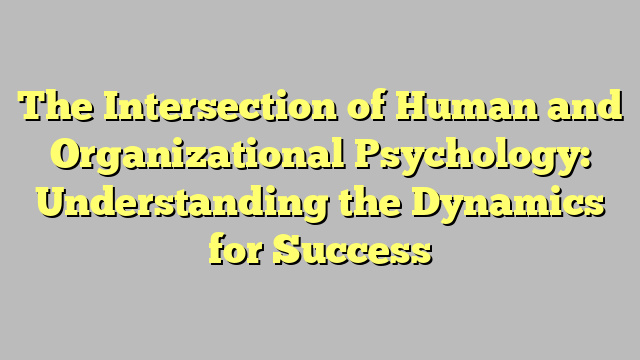The Intersection of Human and Organizational Psychology: Understanding the Dynamics for Success
The Intersection of Human and Organizational Psychology: Understanding the Dynamics for Success
Introduction
Human psychology and organizational psychology are two distinct fields of study, each with its own set of theories and principles. However, there is an intersection between these two disciplines that can greatly contribute to the success of individuals and organizations alike. By understanding the dynamics that arise from the interaction between human and organizational psychology, we can create environments that foster productivity, satisfaction, and overall success.
The Role of Human Psychology in Organizations
Human psychology focuses on understanding individual behavior, cognition, and emotions. In the context of organizations, it helps us understand how employees think, feel, and behave in the workplace. By studying human psychology, we can gain insights into factors that influence motivation, job satisfaction, and performance.
One key aspect of human psychology in organizations is understanding individual differences. People have unique personalities, values, and beliefs that shape their behavior and interactions with others. By recognizing and appreciating these differences, organizations can create inclusive and diverse environments that promote collaboration and innovation.
Another important area of human psychology in organizations is motivation. Understanding what drives employees to perform at their best can help organizations design effective incentive systems and reward structures. By aligning individual goals with organizational objectives, organizations can create a motivated workforce that is committed to achieving success.
The Role of Organizational Psychology in Organizations
Organizational psychology, on the other hand, focuses on understanding the behavior of individuals within the context of the organization as a whole. It examines how organizational structures, processes, and culture influence employee behavior and performance.
One key area of organizational psychology is leadership. Effective leadership is crucial for the success of any organization. By studying organizational psychology, we can gain insights into leadership styles, communication strategies, and decision-making processes that contribute to effective leadership. This knowledge can help organizations develop and nurture strong leaders who can inspire and motivate their teams.
Another important aspect of organizational psychology is organizational culture. The culture of an organization shapes its values, norms, and practices. By understanding the impact of organizational culture on employee behavior, organizations can create a positive and supportive work environment. A strong organizational culture fosters employee engagement, satisfaction, and loyalty.
The Intersection of Human and Organizational Psychology
The intersection of human and organizational psychology lies in understanding how individual behavior and organizational factors interact to influence outcomes. By considering both perspectives, we can gain a comprehensive understanding of the dynamics at play in organizations.
For example, when designing performance appraisal systems, it is important to consider both individual and organizational factors. From a human psychology perspective, we need to understand how employees perceive and react to performance feedback. From an organizational psychology perspective, we need to consider how the appraisal system aligns with the organization’s goals and values.
Similarly, when implementing change initiatives, it is crucial to consider both individual and organizational factors. From a human psychology perspective, we need to understand how employees may resist or embrace change based on their attitudes and beliefs. From an organizational psychology perspective, we need to consider how the change aligns with the organization’s structure and culture.
Creating Environments for Success
By understanding the intersection of human and organizational psychology, organizations can create environments that promote success. Here are some strategies that can help:
- Encourage open communication: Foster a culture of open communication where employees feel comfortable expressing their thoughts and ideas. This promotes collaboration and innovation.
- Provide opportunities for growth and development: Invest in employee training and development programs to enhance skills and knowledge. This not only benefits individuals but also contributes to the overall success of the organization.
- Recognize and reward performance: Implement a fair and transparent performance management system that recognizes and rewards employees for their contributions. This motivates employees to perform at their best.
- Promote work-life balance: Support employees in achieving a healthy work-life balance by offering flexible work arrangements and promoting well-being initiatives. This enhances job satisfaction and reduces burnout.
The Benefits of Understanding the Intersection
Understanding the intersection of human and organizational psychology can have numerous benefits for individuals and organizations:
- Increased productivity: By creating environments that foster motivation and engagement, organizations can enhance productivity and achieve better results.
- Improved job satisfaction: When individuals feel understood and supported, they are more likely to experience job satisfaction and stay committed to their organization.
- Enhanced employee well-being: By promoting work-life balance and supporting employee well-being, organizations can create a healthier and happier workforce.
- Effective leadership: By understanding the dynamics between individuals and organizations, organizations can develop effective leaders who can inspire and motivate their teams.
- Innovation and creativity: By embracing diversity and creating inclusive environments, organizations can tap into the unique perspectives and ideas of their employees, leading to innovation and creativity.
Conclusion
The intersection of human and organizational psychology provides valuable insights into the dynamics that contribute to success in organizations. By understanding individual behavior and organizational factors, organizations can create environments that foster productivity, satisfaction, and overall success. By recognizing the importance of this intersection, organizations can unlock the full potential of their employees and achieve their goals.

